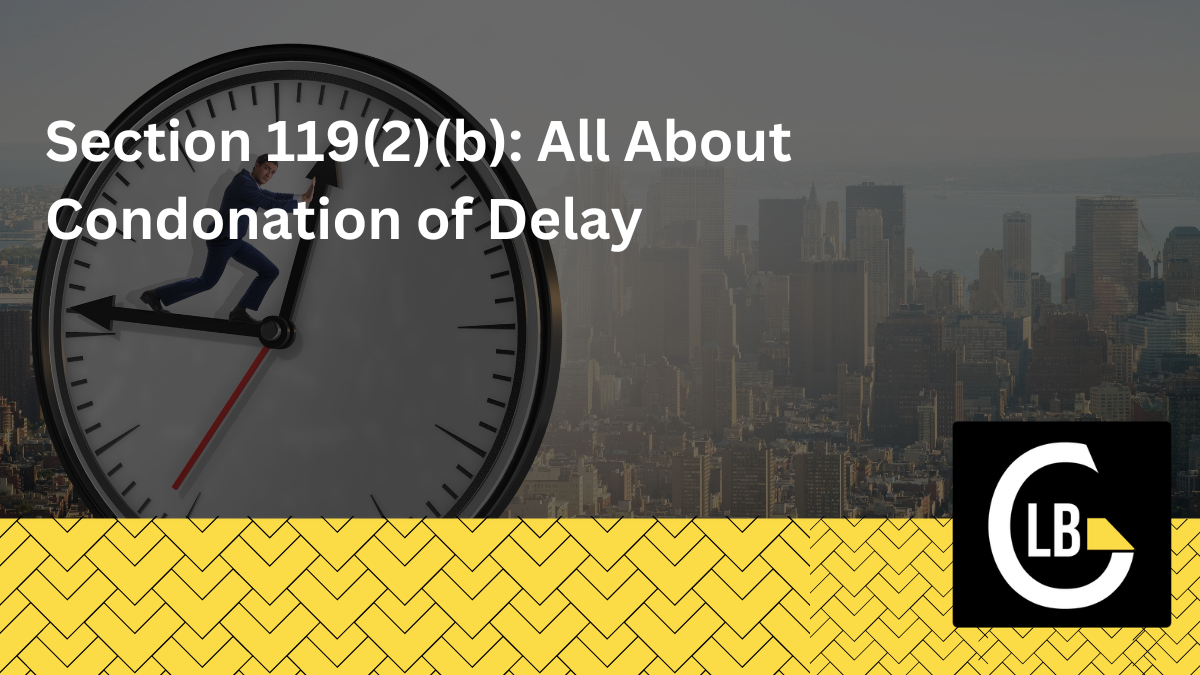Tax deadlines are important, but sometimes life gets in the way, and people miss them. That’s where Section 119(2)(b) of the Income Tax Act, 1961 comes into play. This section allows taxpayers to request relief if they’ve missed a deadline for filing taxes or claiming refunds due to a valid reason. Let’s break it down in simple terms.
What is Condonation of Delay?
Condonation of delay refers to being forgiven for missing a deadline. Section 119(2)(b) allows the Income Tax Department to excuse delays in filing returns or claiming refunds if there’s a genuine reason. This provision gives taxpayers a chance to complete their obligations even after the deadline has passed.
Purpose of Section 119(2)(b)
The idea behind this section is to ensure that taxpayers who couldn’t meet deadlines for reasons beyond their control aren’t unfairly penalized. Unforeseen events happen, and this provision helps ensure that deserving taxpayers aren’t left out simply because they couldn’t file on time.
When Can You Use Condonation of Delay?
- Late Filing of Tax Returns
If you missed the deadline for filing your income tax return, Section 119(2)(b) offers a way to explain why and request an extension. Common reasons might include illness, travel, or other unavoidable circumstances. - Missed Claim for Refund
If you were eligible for a tax refund but didn’t claim it on time, you can apply for condonation to still receive your refund after the deadline.
How to Apply for Condonation of Delay
Here’s how to apply for condonation of delay:
- Submit a Written Request
You’ll need to submit a written application to the tax authorities, explaining the reason for your delay. Attach any supporting documents that show why you couldn’t meet the deadline, such as medical reports or travel documentation. - Provide a Valid Explanation
Your application should clearly explain why you missed the deadline and show that the delay was beyond your control. - Await the Decision
The tax authorities will review your application. If they accept your reasons as valid, they will condone the delay, allowing you to file your return or claim your refund.
Conditions for Approval
Not every delay is automatically forgiven. To get approval, you need to meet certain conditions:
- Legitimate Reason
The delay must be due to a valid reason, such as an illness or unexpected situation, where you had little control over missing the deadline. - No Intent to Evade
Your application shouldn’t show any intent to avoid paying taxes. If the authorities suspect any wrongdoing, your request may be denied. - Timely Application
Even though the delay is being condoned, you still need to apply within a reasonable time after missing the deadline. A long gap without any action could hurt your case.
Who Has the Power to Approve?
The authority to approve or deny condonation of delay rests with the Central Board of Direct Taxes (CBDT). Depending on the amount involved, the request can be handled by different levels of tax officers. For smaller amounts, the Principal Commissioners of Income Tax (PCIT) can approve the request, while larger amounts might need higher-level approval.
Key Court Decisions
Courts have taken a balanced approach to condonation of delay cases. For instance, the Supreme Court in Collector, Land Acquisition v. Mst. Katiji (1987) emphasized that deadlines shouldn’t be applied too strictly when a taxpayer has a genuine reason for the delay.
Conclusion
Section 119(2)(b) is a helpful provision for taxpayers who miss deadlines for legitimate reasons. It allows them to request extra time to file tax returns or claim refunds, provided they can show that the delay was due to factors beyond their control. If you’ve missed a tax deadline, this section might offer you a chance for relief.
The key to a successful application is to provide a valid explanation and act promptly. If you’re unsure how to proceed, consulting with a tax professional can help you navigate the process smoothly.
